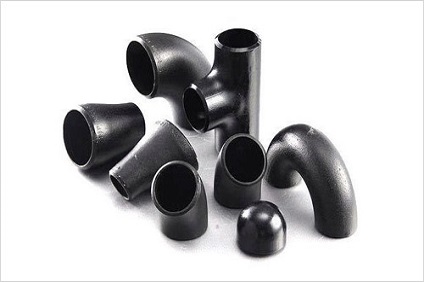Carbon Steel Fitting Pipe
What is a CS Pipe?
Carbon steel piping is pipes made of steel with carbon as the main alloying component, used for transporting fluids. CS pipe fittings are fittings made of carbon steel that are used to connect pipes and tubes in a piping system. They come in various types, shapes, and sizes to suit different applications and are often used in industries such as oil and gas, chemical, and power generation.
What is CS materials?
Carbon Steel (CS): Steel is basically a solution of carbon (C) in ferrous (FE). Carbon steel is the denomination for the steel that has almost no metallic alloy element added to it. Carbon steel represents broad range of steel that contain. (a) 1% carbon (max) (b) 1.65% manganese (max)
What is difference between CS pipe or SS pipe?
Their main difference is alloy content carbon steel has under 10.5 percent alloy content, while stainless steel must contain 10.5 percent chromium or more. That essential difference is what gives carbon steel and stainless steel their distinct physical characteristics.
Some common types of CS pipe fittings include:
- CS Elbow: A fitting that allows for a change in the direction of the pipe.
- CS Tee: A fitting that allows for a connection of three pipes in a T-shaped configuration.
- CS Reducer: A fitting that allows for a connection of pipes with different diameters.
- CS Coupling: A fitting that connects two pipes of the same diameter.
- CS Union: A fitting that allows for easy disassembly and reassembly of pipes.
CS pipe fittings are preferred in many applications because of their strength, durability, and ability to handle high temperatures and pressures.
To use CS pipe fittings, the process is similar to that of SS pipe fittings. You will need to prepare the pipes, apply sealant, connect the fitting, and test for leaks. It’s important to use the appropriate CS fittings for the application, and to refer to the manufacturer’s instructions for specific guidance.
To use CS pipe fittings, you will need to follow a few steps:
- Prepare the pipes: Before connecting the pipes with CS fittings, make sure that the ends of the pipes are cut square and free of any burrs or debris.
- Apply sealant: Apply sealant on the threads of the male end of the fitting. This will help to prevent leaks.
- Connect the fitting: Screw the fitting onto the pipe and tighten it with a wrench. Make sure not to over-tighten the fitting as this can cause damage to the threads.
- Repeat: Repeat the process for the other end of the fitting and the other pipe.
- Test for leaks: Once the fittings are connected, test the system for leaks by running water or air through it.
It’s important to note that different types of CS fittings may have slightly different installation procedures, so it’s important to refer to the manufacturer’s instructions for specific guidance.
It’s also important to use the appropriate CS fittings for the application. For example, if the system will be handling high pressures or temperatures, it’s important to use fittings designed for these conditions.
CS pipe fittings are a strong and durable option for connecting pipes and tubes in a variety of industries.
There are several benefits of using CS pipe fittings:
- Strength and durability: Carbon steel is a strong and durable material, which makes CS pipe fittings suitable for use in applications where the system may be exposed to high pressures or temperatures.
- Cost-effective: CS pipe fittings are generally more cost-effective than other materials such as stainless steel, making them an attractive option for many applications.
- Availability: Carbon steel is widely available, which makes CS pipe fittings easy to source.
- Versatility: CS pipe fittings come in a variety of types, shapes, and sizes, which makes them suitable for a wide range of applications.
CS pipe fittings find applications in a wide range of industries, some of which include:
- Oil and gas industry: CS pipe fittings are commonly used in the oil and gas industry because of their strength, durability, and ability to handle high pressures and temperatures.
- Chemical industry: CS pipe fittings are used in the chemical industry because of their ability to handle corrosive chemicals and high temperatures.
- Power generation: CS pipe fittings are used in power plants because of their strength and durability.
- Construction: CS pipe fittings are used in construction for piping systems that require a high degree of strength and durability.
CS pipe fittings are a reliable and cost-effective option for connecting pipes and tubes in a variety of industries.


